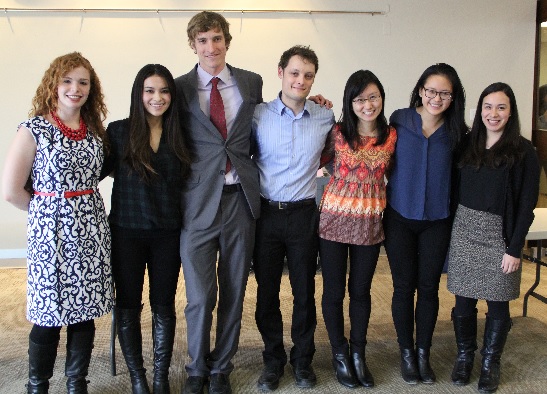2016 Summer Research Symposium
Sunshine poured through the windows of BUSM’s Hiebert Lounge, illuminating large hanging posters marked with graphs and important data. Much like a science fair, faculty and staff mingled and moved among the room, taking the time to look over the research projects and presentations in front of them.
During summer 2015, 45 BUSM students participated in the Medical Student Summer Research Program (MSSRP). Organized through the Office of Enrichment and supported by longtime donor Jerome Serchuck, the program gives medical students funding to conduct eight-week research projects under the guidance of a faculty mentor. On Friday, Jan. 29, the students shared the research they conducted and for the first time, listened attentively to oral presentations from four selected peers.
“This symposium allows our students to formally present their work and receive recognition from the medical campus community,” said Suzanne Sarfaty, MD (BUSM ’88), assistant dean for academic affairs and director of the program. “It also generates enthusiasm for fellow medical students who are considering summer research.”
“This program gives us a chance to dip our toes in the water with very low risk,” said Melissa Warsdtadt, BUSM ’18. “Even if you have some research experience, it’s an opportunity to expose yourself to new things and work with someone from our amazing faculty. I had a fantastic experience.”
Traditionally, the research symposium was only offered to first year medical students who had completed the MSSRP program over the summer. In an effort to give all medical students an opportunity to have the experience of producing a poster and presenting their work in front of colleagues the Office of Enrichment opened the symposium to all medical students.
“For me, my third year of medical school was winding down and I got the itch to get back into research,” said Matthew Strickland, BUSM ’16, when asked why he chose to participate in the program. “I think for any medical school, research is the tool to change things for the better for patients. You always want a strong research foundation and opportunities for students for training in that context.”
Seven students were presented with Serchuck awards for the best clinical science, basic science, and best QI or medical education research. The awards are named in honor of Serchuck who has given generously to the research program since its official establishment in the summer of 2000.

Serchuck Awards:
Best Clinical Science:
Jane Qu: “The Effect of Elderly Patients’ Life Stories on the Geriatric Attitudes of Medical Professionals”
Rainjade Chung: “Modeling Young Child Hospitalization Costs Attributable to Food Insecurity”
Honorable Mention:
Gabriel Lerner: “A Novel Classification of Polypharmacy in a Cohort of HIV-Infected Adults with Substance Dependence”
Best Basic Science:
Angela Nolin: “Albumin Reabsorption in the Proximal Tubule Causes Accumulation of Dysfunctional Mitochondria”
Honorable Mention:
Estela Chen: “p300 Binds MITF Promoter in Melanoma Cells”
Best QI or Medical Education:
Gareth Marshall: “Effectiveness of Pre-learning Online Modules in a First Year Medical Curriculum”
Honorable Mention:
Brenda Garcia: “Optimizing Nutrition for Very Low Birth Weight Infants Born at Boston Medical Center”
View the Facebook album.